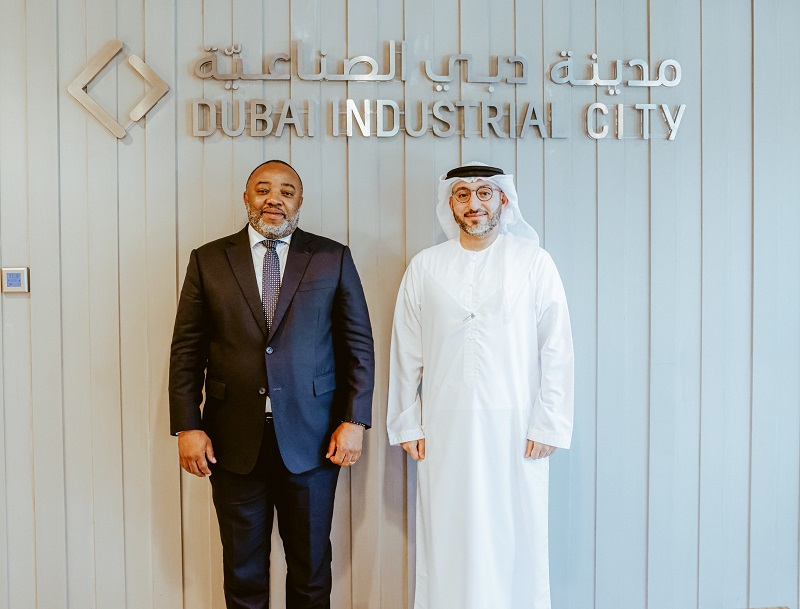A trade delegation from Angola visited Dubai Industrial City (DI) to explore opportunities for collaboration within the context of the West African country’s strategy to drive industrialisation and develop a manufacturing hub.
The delegation, led by Victor Francisco dos Santos Fernandes, Minister of Trade and Industry, was received by Saud Abu Alshawareb, Managing Director of DI, who provided an overview of the business district’s leading role in driving the growth of an advanced and sustainable manufacturing sector in the UAE.
Abu Alshawareb said, “Thanks to its strategic location on the Arabian Gulf, Dubai has long acted as a trade gateway for African countries looking to export their products to the wider Middle East. There are currently more than 21,000 African companies operating in Dubai, a number that has increased by more than 25% over the past four years.”
As the two leaders discussed the importance of food security, Abu Alshawareb highlighted the important role DI is playing in helping the UAE fulfil its long-term objectives in that area.
“Dubai Industrial City works closely with the Ministry of Environment and Food Security in the UAE, and has a dedicated zone for F&B.
“We have more than 23.5 million sq. ft. of land dedicated to the F&B sector and provide an agile and flexible environment for companies to reach two-thirds of the world’s population in eight hours.”
Abu Alshawareb provided the delegation with an overview of DI’s facilities and partner case studies, also explaining how the district is playing a key role in fulfilling Dubai Industrial Strategy 2030, which seeks to transform the emirate into a global platform for knowledge-based, sustainable, and innovative industries. Of the six sectors Dubai is seeking to develop under this vision, DI is working on building the capabilities of FMCG and machinery and equipment.
Fernandes said: “We wanted to see what we can learn here that could help us accelerate our own country’s economic growth. I can see that there are many opportunities here to facilitate trade and investment between Angola and the UAE.
“Restructuring the economy is one of our main areas of focus and there are several lessons that we can take away from the UAE in this regard, as a country that has successfully diversified its economy away from a dependence on oil.”
The visiting delegation also toured two F&B facilities in DI: the Asmak seafood processing facility, followed by Anorka Food Industries.
At the Asmak facility, which is a seafood processing and logistics hub, senior Asmak management gave Abu Alshawareb and Fernandes a guided tour of the factory, which handles both locally caught and imported fish and shrimp. The region’s largest seafood facility carries out a broad range of fish processing activities, including the deboning of fish and smoking of salmon.
The facility, opened earlier this year at an investment of more than Dhs200 million, has the capacity to process, store and distribute a quarter of seafood consumed in the UAE.
During the visit to the Anorka Food Industries in Dubai Industrial City, the Angolan delegation were greeted by Belal Mohamad Al Hamwi, CEO of Anorka Food Industries, who guided them through the facility’s roastery and coffee beans processing areas.
Anorka Food Industries is a coffee manufacturer that exports ‘Made in UAE’ brand coffee and coffee-based beverages to a swathe of international markets, including Canada.

